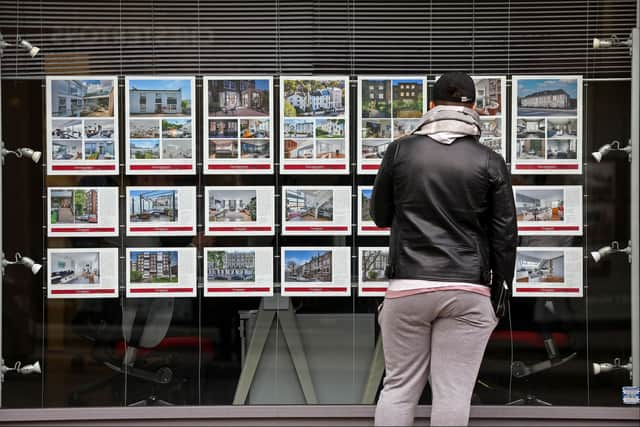First time house buyers advice: Experts reveal their tips for getting on the property ladder in 2023
and live on Freeview channel 276
Leading property experts from around the UK have revealed how enhancing your credit score, budgeting and negotiating could make the goal of becoming a home owner a reality this year.
John Howe, who a partner at West Yorkshire law firm John Howe & Co, explained the importance of keeping an open mind when purchasing your first home.
“Entering the property market for the first time can be daunting but the process can be made less intimidating. Doing lots of research in advance can take away some of the headaches.
“Be clear on where you want to live, but keep an open mind on the type of property you consider. Work out what you can afford, set a budget and stick to it,” John said.
You may not be able to move into your dream home straight away, but with home rental prices at an all time high now is the time to get on the property ladder.
John added: “Importantly use common sense. You may not be able to afford your dream home straight away and so consider a property that enables you to first of all get on the property ladder, which may not be your dream home but could be used as a steppingstone to get there without running any financial risk.”
So, whether you plan to live alone, with a partner or with a friend, we have done the research for you. Here are 11 tips for first time buyers looking to get onto the property ladder:


1. Consider using a mortgage advisor
A mortgage advisor or mortgage broker, is a person and/or company that helps you to work out what you can afford to pay, choose a suitable lender and find the best mortgage deal for your situation.
As the market for mortgages has become more competitive, the role of the mortgage broker has become more popular. Whilst it is not essential, it’s highly recommended especially for first time buyers as the process can be overwhelming.
Pete Mugleston, MD and mortgage expert at the www.onlinemortgageadvisor.co.uk, said: “Looking for your first home is a really exciting time and you might be tempted to go for the first property that you like the look of, but rushing the process could cost you more time and money down the line.
“Buying a property is a lengthy process which involves searching for a house that you like, seeking a mortgage, putting an offer down and much more, so patience is key in order to get the best possible property for your budget.
“I’d recommend working with an experienced mortgage broker as soon as you start your journey towards getting on the property ladder. Mortgage brokers have expertise and knowledge of all of the different options available to first time buyers and will be able to recommend the best mortgage deals for you and your situation.”
2. Check and enhance your credit score
A lender is a bank or building society which ‘lends’ you the funds to buy a property, which you then pay back to them as monthly mortgage payments (with interest).
However, lenders will only hand out money to those who they can trust to pay it back. This is where your credit score can help.
A low credit score (or no score at all) can affect your chances of being approved for a mortgage as it shows the lender that you may be unable to keep up with the monthly repayments.
A high credit score shows you have been paying any debts (credit cards, bills etc) on time and will boost your chances of being accepted by a lender.
There are many ways to keep track of your credit score and you can even work on improving it before applying for a mortgage.
ClearScore is a free to use app which gives you an instant credit score. It will also suggest ways to improve or maintain your score, for example getting a credit card if you haven’t already got one.
Justin Basini, CEO & co-founder of ClearScore, said: “It is important that as a potential first-time buyer you have your finances in order before applying for a mortgage, and the number one priority is to check your credit score and report.
“Remember, credit scores look at the past, not the future, so if you’ve never been in debt, you won’t automatically have a great credit score.”
Justin explained how first time buyers can improve their credit score, saying: “If you’ve never borrowed, or only borrowed a small amount of money, then it’s harder for lenders to judge your habits. If you can afford it, then using a credit card regularly and responsibly can grow your credit score by proving to lenders that you’re a person they can trust to repay what you’ve borrowed.
“If you have damaged your credit score in the past, all is not lost, there’s plenty that you can do to improve your score. This includes registering to vote, making sure all your accounts are registered to the correct addresses, paying bills on time and only using (and paying off) the credit that you need.”
Justin warned that first time buyers should “think about the company” they keep as this can have a negative impact on credit score.
He said: “Your partner or housemates can impact your score. Although credit scores are calculated on your individual credit history, if your partner has a bad credit score and you apply for a mortgage together, lenders will look at both scores.
“If your partner has a worse credit score than you, it can reflect poorly upon your current and potential future credit rating as a link will be registered to your credit report with any joint accounts. It’s therefore always best to discuss finances with another person before making any big financial decisions.”


3. Consider a shared mortgage to lower the buying costs
Shared mortgages aren’t, as of yet, one of the most popular routes to go down but can be extremely helpful for those who don’t have as much money saved up.
Amy Gooder, the Yorkshire regional sales manager at Guinness Homes, said: “Whilst still widely misunderstood by the public, shared ownership is helping first-time buyers get their foot on the property ladder and is vastly more affordable than traditional property purchase routes.
“Shared ownership buyers purchase a percentage of their home from the housing developer, typically around 50 per cent, but can be suited to the buyer’s needs and requires a much smaller deposit and mortgage. A small monthly rent is then paid to the developer at 2.75 per cent of the remaining unpaid equity.
“Homeowners have the option to purchase additional shares of the property over time, known as ‘staircasing’. When additional shares are purchased, monthly rent payments to the developer decrease, meaning that owners are able to increase the amount of property they own in line with what they can afford.
“As with any house purchase, the buyer’s affordability is calculated in line with the mortgage lender’s requirements. However, the purpose of shared ownership is to be the fairest method of homebuying and help those who may not otherwise be able to own their own property.
“Often coupled with community facilities, such as coffee shops, local amenities and gyms, shared ownership developments are attractive options for many, particularly for first-time buyers.”
4. Get a decision in principle before you start viewing
A decision in principle, or an agreement in principle, is a document obtained from a lender of your choice which shows how much money they would be willing to offer to you towards the purchase of a home.
The agreement with the lender lasts three to six months, depending on which you go with, but you can easily renew this agreement if you haven’t found a property in that time.
Some estate agents may not allow you to book a house or flat viewing without a decision in principle, as they want to know you are serious about buying a home.
However, it is important to know that having a decision in principle does not mean you will definitely be accepted for a mortgage when the time comes to apply. The application for a mortgage looks into much finer details that a decision in principle doesn’t - including payslips and bank statements.
Kate Burns, founder of KB Mortgage Services in Huddersfield, said: "I’d always recommend getting an AIP [agreement in principle] in place before conducting a property search. It means you will know how much you can afford to borrow and what property bracket to be looking at, based on your income
“Estate agents will ask you if you have one in place. If multiple people put an offer in on a home, you will be a more attractive buyer if you have one in place, making them more likely to accept your offer
“Only get one AIP in place. Don’t request one from multiple banks, as this may affect your credit score. Choose one that offers a soft search rather than one that leaves a hard footprint on your credit history.”


Kevin Roberts, Managing Director of Legal & General Mortgage Services, explained how working with a mortgage advisor can benefit you when finding a suitable lender, prior to applying for your decision in principal.
Kevin said: “This is the first and most fundamental step in deciding a budget, so it’s important to get it right. Advisers work closely with many mortgage lenders, so they will be able to help find a lender that is suitable for individual needs and circumstances, and this can be especially important for those who have more complex finances or are self-employed.”
5. Know what you can realistically afford
As much as we would all love a five-bedroom mansion with a pool, don’t be unrealistic about what you can afford. If you opt to hire a mortgage advisor, they will help you with this task.
You will be asked to pay at least 10% of the property price as a deposit (sometimes 5%). So if you’re looking at a property which is on the market for £150,000 - make sure you can easily afford a £15,000 deposit.
Once you have paid a 10% deposit, a property of the price above would then cost a further £135,000 - this is the money that you borrow from a bank (known as a lender).
However, the bank will usually only lend an applicant 4 to 4.5 times their salary, so if you want to borrow £135,000, you will have to be earning between £30,000 and £33,75 a year. This can be a combined salary if you are buying with someone else.
You will then pay the lender back monthly, with an agreed interest rate (fixed or tracked). These monthly mortgage repayments are usually paid over 25 to 30 years, depending on your retirement age.
Not only will you pay your mortgage off monthly, but you will also pay extra for bills such as water, electricty, heating and council tax. On top of this, think about money you will spend on food and other bills (phone bill, Netflix subscription etc).
Melanie Whiting, the Mortgages Manager at Norton Finance in Rotherham, said: “When working out your monthly budget, be mindful not to underestimate costs of food, household bills etc especially with the cost of living increasing at this moment in time. Also be mindful that mortgage rates have increased and could increase further, so take the potential for increasing costs into account and don’t overcommit yourself.”
Adam Woods, Branch Manager of Redian in Armagh, added that first time buyers should think about the size of the home they are buying. He explained: “Utility bills like electricty and heating can range massively in price depending on the property. It will be a lot more expensive to heat a three-bedroom house than a one-bed flat, so think about this and add it to your long term budget.”
6. Know exactly what you are looking for
Not only do you need to know how many bedrooms you want in your new home, but also think about other things your dream property should include - this might be a garden, a garage, a driveway, or even space for a home office.
The location is also extremely important. Even if you don’t have children now, you may want to look at the schools in the area so you know for the future. You should also consider nearby transport links, especially if you don’t drive.
Max Sugden, Transactions Director at home construction company Telford Homes in London, said: “You want to think about whether your new neighbourhood will be fit for all your lifestyle needs and whether the amenities that are important to you are conveniently located, be that a nursery, healthcare centre, transport links or restaurants. Do your research and make sure you can really see yourself living there.”
7. Get familiar with extra costs involved in buying a home
When trying to get on the property ladder, it is important to remember that the deposit is not the only cost.
Firstly, be warned of the extra costs that come with buying a flat, rather than a house. Those who are looking to live in a flat may have to pay further monthly or yearly fees to the building manager.
Once you have decided between a house or a flat, you will need to hire a conveyancer who will organise all legal documents when it comes to transferring the ownership of a property from one party to another.
Conveyancing costs vary depending on the price of the property, but expect to pay between £850 and £1500 for their work. This will be paid on completion of the property.
Also take into account any estate agent fees, mortgage advisor fees and generally costs related to the removals and moving process itself.
If you have furniture at your current home (whether this be a rental or living with parents), it can cost anything between £80 and £200 a day to hire a van for moving.
Luckily, first time buyers in England and Northern Ireland no longer have to pay any Stamp Duty Land Tax - if the property purchase price is under £425,000 - so this is one less bill to think about.
8. Look at which companies are offering incentives


Some housing developers offer incentives to first time buyers. This could mean them matching your deposit, or genuinely lowering the deposit price to help you get on the property ladder.
These are most commonly offered to those buying a new build. Max Sugden, theTransactions Director at Telford Homes, explained the incentive for buying a property at Telford Homes’ The Lock.
He said: “With Telford Homes’ Deposit Match incentive, first-time buyers will only need a 5% deposit to secure their new home! Get on the property ladder with a 5% deposit and Telford Homes will match it with an additional 5% of the sale price, freeing up any spare savings to help with the cost of moving or furnishing your new home. This will give first-time buyers a 10% deposit in total, meaning they’ll need a 90% mortgage via a reputable lender.”
9. Ask lots of questions at house viewings
Don’t be afraid to ask questions when you are viewing potential homes. The estate agents will expect this and should have most of the information you need.
Any information they don’t have to hand, they will be happy to call you back following the viewing to answer further questions.
Adam Woods, Branch Manager of Redian in Armagh, said: “We don’t mind answering questions, so make sure to ask them. We will always try to tell you the heating types and EPC ratings at a viewing, and anything we can’t answer on the spot, we will call you back once we’ve got the answer.”
Things to ask should include heating type, council tax band, and EPC rating. It’s also important to check what’s included in the sale price - will the previous owner be leaving any fixtures or fittings? This could include anything from blinds to a garden shed.
Depending on your mains heating types (gas, oil, electric), you will be charged a different amount. Gas is the most common, and at the time of writing prices for gas central heating are high - however electric is usually the most expensive.
You also might be interested to know how long the property has been on the market - a property may be overpriced if it has been on the market for a long time.
Estate agent Adam also suggested booking a second viewing. He said: “I would recommend coming back for a second viewing, if you are interested in the property. You want to make sure you saw absoutely everything before putting in an offer.
“You will also benefit from seeing the property once during the day and once in the evening. It will give you a realistic view of parking arrangements, noise levels and lighting.”
10. Don’t be afraid to negotiate a price for the property
Whilst at a viewing, if you notice the property needs a lot of work but you are interested to take on that task, or if you believe a property is overpriced, then put in an offer below asking price.
Polly Gilbert, from family mortgage broker Tembo Money, said: “An anticipated drop in house prices could be beneficial, as buyers will need a smaller deposit if they buy at a lower price. But it also means there should be more room for negotiation - so buyers should feel confident to speak with the seller or estate agent if they feel the property is overpriced, or issues come up in the survey. We began to see an increase in down-valuations at the end of 2022, which indicates this softening in prices has already begun.”
11. Organise your documents
During the buying process, you will be asked to send a number of documents to a number of different parties - this could be actual copies or photocopies.
When your offer on a property has been accepted, your solicitor will ask you for six months worth of bank statements for the account(s) that your deposit will be paid from. If your deposit, or part of it, is being gifted by a family or friend, you will need their bank statements too.
Ahead of release of funds, the lender will ask you to provide your last three months of payslips, which must show both your name and your employer’s name.
If this can’t be provided (for example you are in a new job), you will be asked to forward a contract of employment with salary details outlined.
Ahead of time, try gathering together the things listed above as well as keeping your passport/ID in close reach. It will help to speed up the process.
Whilst organising your documents, particularly bank statements, Melanie Whiting, the Mortgages Manager at Norton Finance in Rotherham, suggests making sure they look “healthy”.
Melanie said: “Ensure that your bank statements are healthy before applying. This means no returned direct debits, and gambling being kept to an absolute minimum as lenders are sometimes wary of these transactions.
“It will definitely pay for first time buyers to overhaul bank statements and cancel any subscriptions that aren’t necessary as well as keeping general spending to a reasonable level in preparation.”
